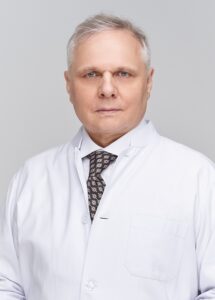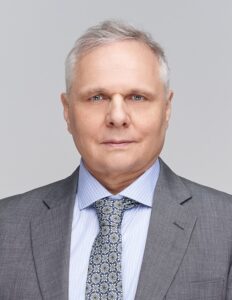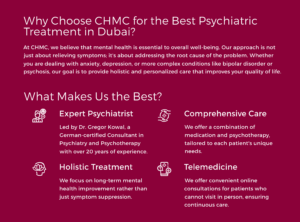Psychiatrist in Dubai – Dr. Gregor Kowal at CHMC
Psychiatrist in Dubai | CHMC German Clinic for Psychiatry and Psychology
At CHMC Dubai, we provide world-class psychiatric and psychological care led by Dr. Gregor Kowal, a German Board-Certified Consultant in Psychiatry and Psychotherapy. If you’re searching for a trusted and professional psychiatrist in Dubai, our psychiatric clinic in Dubai Healthcare City delivers compassionate, Western-standard treatment.
As one of the most reputable psychiatrists in Dubai, Dr. Kowal focuses on understanding both symptoms and the root causes behind mental health challenges. Whether you’re seeking expert guidance, long-term support, or reliable psychiatric care in Dubai, our team ensures personalized, evidence-based services to help you regain control and well-being.
Meet Dr. Kowal—German Psychiatrist in Dubai at CHMC

Dr. Kowal graduated from the prestigious University of Heidelberg, one of Germany’s top medical schools. During his time there, he conducted significant clinical research, culminating in a doctoral dissertation.
After completing extensive training in psychiatry and psychotherapy, Dr. Kowal worked as Head of Department and later as Medical Director in psychiatric hospitals across Germany.
In addition to his qualification in psychiatry, Dr. Kowal is also trained as a psychotherapist with a foundation in psychoanalytical psychotherapy. His approach combines evidence-based psychiatric treatments with a deep commitment to individualized psychotherapy, offering compassionate care to his patients. Dr. Kowal has founded and served as the Medical Director and leading psychiatrist at CHMC since 2010.
Dr. Kowal specializes in treatment for depression, anxiety, bipolar disorder, ADHD, PTSD, psychoses, and more.
Book an Appointment with Our Psychiatrist in Dubai
🗓️ Open Monday to Saturday | 8 AM – 6 PM
Our reception team will help schedule your first consultation and answer any questions you may have. We provide confidential support at every step.
Our team is here to guide you at every stage of the process. We provide friendly, confidential surroundings where you can feel free and at ease sharing your worries.
Table of Contents
Comprehensive Psychiatric Treatment in Dubai
At CHMC, we believe that effective psychiatric care goes beyond medication. It requires time, consistency, and a deep understanding of each individual’s needs. That’s why all therapy sessions are conducted by your dedicated psychiatrist and psychologist — ensuring long-term trust and continuity of care.
Treatment begins with a comprehensive 90-minute assessment, followed by 30-minute follow-up sessions, tailored to your ongoing progress and therapeutic goals.
Psychiatrist versus Psychologist
Many people struggling with emotional or mental health issues often wonder whether they should consult a psychiatrist or a psychologist. The difference between these two specialists is not always clear, which can make the decision confusing. If you are looking for professional psychiatric care, understanding these differences will help you choose the right mental health professional in Dubai.
Psychiatrist
A psychiatrist in Dubai is a medical doctor specialized in diagnosing and treating mental health disorders. Psychiatrists have extensive training in brain function, neurochemistry, and the biological causes of psychiatric conditions. Because of their medical background, they can prescribe medication when needed. For example, in cases of severe depression, a psychiatrist may prescribe antidepressants to correct chemical imbalances in the brain. In addition to medication, a psychiatrist can also provide psychotherapy or refer patients to a psychotherapist for ongoing counseling.
Psychologist
A psychologist, on the other hand, does not prescribe medication. Psychologists focus on “talk therapy” (psychotherapy or counseling) to help people manage stress, overcome emotional challenges, and improve coping strategies. In many cases, a combined approach—medication from a psychiatrist and therapy from a psychologist—offers the most effective results.
Mental Health Matters
It is a common mistake to think that only severe conditions require professional psychiatric help. In reality, no psychiatric problem is too small to seek support. Sometimes feelings of sadness, fear, or stress can become overwhelming, and friendly advice may not be enough. If symptoms persist or interfere with daily life, consulting a psychiatrist can make a significant difference.
Seeking help early prevents problems from escalating and reduces the risk of long-term suffering. An initial consultation allows the psychiatrist to assess your situation and recommend treatment—whether through psychotherapy, medication, or a combination of both.
When to See a Psychiatrist in Dubai
Some mental health conditions may first appear as physical symptoms, such as fatigue, headaches, or sleep problems. While a family doctor may treat these issues symptomatically, the underlying psychiatric cause can remain unnoticed. This is why visiting a psychiatrist is crucial if emotional or behavioral difficulties persist despite basic medical care.
Situations when it is wise to see a psychiatrist include:
- Anxiety
- Depression
- Panic attacks
- Flying Phobia
- ADHD
- Bipolar Disorder
- Any mental health condition that impacts daily functioning
What Are Psychiatric Disorders
A psychiatric disorder is defined as a prolonged or recurring significant deviation of feeling, thinking, or behavior. In the past decades, mental health disorders have increased dramatically, ranking among the most common diseases. Nearly half of all people experience at least one relevant psychiatric disorder in their lifetime.
In recent years, sick days and early retirements due to psychiatric illnesses have steadily risen, with depression and anxiety making up most diagnoses.
A variety of factors can cause mental health disorders. Genetic factors, physical illnesses, current life events, past stressful events, psychological conflicts, and interpersonal tensions all can trigger the onset of psychiatric disorders.
Most Frequent Psychiatric Conditions in Dubai
In Dubai, as elsewhere, depression and anxiety disorders are among the most frequently diagnosed conditions. Other common disorders include bipolar disorder, obsessive-compulsive disorder (OCD), panic disorder, and post-traumatic stress disorder (PTSD).
Psychiatrist and Use of Psychotherapy
A well-trained psychiatrist in Dubai does not only prescribe medication but also uses psychotherapy as part of treatment. In fact, in many European countries such as Germany, psychotherapy has been an integral part of psychiatric training since the 1990s. This ensures that psychiatrists are equipped to provide both medical and psychotherapeutic care, offering patients a more holistic approach to mental health.
Psychiatrists may also pursue additional specialization in areas such as behavioral therapy, psychoanalysis, depth psychotherapy, or gestalt therapy. These focused fields allow them to adapt treatment methods to each patient’s individual needs. At CHMC Dubai, Dr. Gregor Kowal combines his expertise in biological psychiatry with advanced training in psychoanalytical psychotherapy. This dual qualification enables him to address both the medical and psychological aspects of mental health disorders.
Our Psychiatric and Psychotherapeutic Team at CHMC Dubai
At CHMC, we provide patients with access to a Western-qualified team of specialists who treat a wide range of psychiatric disorders. Whether short-, medium-, or long-term support is needed, our clinic offers tailored care for patients from Dubai, the wider UAE, and neighboring countries.
In addition to treating psychiatric conditions such as depression, anxiety, bipolar disorder, OCD, and ADHD our therapists also assist patients facing life challenges, partnership conflicts, work-related stress, grief, sexual disorders, and personal development issues. Each treatment plan is designed with sensitivity to the patient’s cultural background, lifestyle, and personal circumstances.
A German Standard of Psychiatric Care
Every treatment at CHMC Dubai begins with a thorough assessment. This includes a detailed clinical interview, physical examination, and, when needed, additional diagnostic tests. This structured approach reflects German medical standards, ensuring that underlying causes are identified and that both psychiatric and physical health factors are taken into account.
High-quality psychiatric treatment also depends on continuity of care. For this reason, our patients always see the same psychiatrist in Dubai or psychologist throughout their treatment journey. This consistency fosters trust and helps build a strong therapeutic relationship, which is essential for lasting recovery.
 Dr. Annette Schonder, Psychologist, Marriage- and Hypnotherapist, American Board Certified
Dr. Annette Schonder, Psychologist, Marriage- and Hypnotherapist, American Board Certified
Dr. Schonder studied Psychology at George Mason University in Fairfax, Virginia, USA. She continued her academic journey at Breining Institute in Orangevale, California, earning a Doctorate in Psychology. Dr. Schonder pursued extensive education in psychotherapy and hypnotherapy. She is a Certified Clinical Counsellor and Clinical Hypnotherapist. She holds memberships in the American Psychological Association and the National Guild of Hypnotists (NGH), USA.
Alongside her psychotherapeutic work, Dr. Schonder lectured for a total of 15 years at Frederick Community College, Chapman University, Mission College, and Orange Coast College, USA.
Dr. Schonder is trained in evidence-based treatment methods, including Person-Centered Therapy (PCT), Cognitive Behavioral Therapy (CBT), Dialectical Behavioral Therapy (DBT), Motivational Interviewing (MI), Exposure and Response Prevention (ERP), The Gottman Method, Family of Origin Dysfunction Therapy, Trauma and Grief Work, and Ericksonian Hypnotherapy.
She treats a wide range of psychiatric conditions, mood and anxiety disorders, personality disorders, obsessive-compulsive disorder (OCD), post-traumatic stress disorder (PTSD), attention-deficit/hyperactivity disorder (ADHD), grief and bereavement counselling and mindfulness-based interventions and marital problems.

Dr. Gregor Kowal, Consultant in Psychiatry, and Psychotherapy, German Board Certified
Dr. Gregor Kowal is a German Board-Certified Consultant in Psychiatry and Psychotherapy with over two decades of clinical experience. He completed his medical education and PhD at the prestigious University of Heidelberg, followed by postgraduate specialization in psychiatry and psychotherapy through the Medical Chamber of Koblenz.
Dr. Kowal has served in leading roles as Head of Department and Medical Director at major psychiatric hospitals in Germany, where he also mentored junior doctors and psychologists. Since founding CHMC in 2010, he has been dedicated to offering comprehensive psychiatric care that integrates evidence-based medication with individualized psychotherapy.
Dr. Kowal is trained in both biological psychiatry and psychodynamic psychotherapy. His psychotherapeutic training included extensive theoretical coursework and a rigorous state examination. Over the years, Dr.Kowal has treated thousands of patients using a comprehensive approach that skillfully integrates psychopharmacological treatment with psychotherapy.
His ultimate goal is not only to alleviate symptoms but also to uncover the root causes of psychological distress. By providing his patients with the time and support needed to resolve underlying conflicts, he aims to facilitate deep and lasting healing.
 Krishnapriya – Clinical Psychologist, Marriage Therapist
Krishnapriya – Clinical Psychologist, Marriage Therapist
Krishnapriya is a licensed Clinical Psychologist under the Dubai Health Authority (DHA) and a member of the American Psychological Association (APA).
She holds a Master’s degree (MSc) and a Bachelor’s degree in Psychology and Mental Health from the University of Gujrat, India. Following her academic studies, she expanded her training at renowned institutions in the United Kingdom and the United States. She has actively participated in several research projects and contributed to publications in leading American and British psychological journals.
With several years of professional experience, Krishna has worked in psychiatric hospitals and, for the past two years, has been part of the team at CHMC, German Psychiatric Clinic in Dubai. She provides individual and couples therapy to the city’s diverse, multicultural population, applying a holistic approach that considers all aspects of her clients’ lives to address their unique therapeutic needs.
In addition to her core training, she has obtained advanced certifications in multiple therapeutic modalities, including Cognitive Behavioral Therapy (CBT), Client-Centered Therapy, Interpersonal Therapy (IPT), Dialectical Behavioral Therapy (DBT), and Motivational Enhancement Therapy.
Krishna is also highly skilled in psychological assessment and testing, with expertise in administering and interpreting a wide range of standardized tools such as the IQ Test, Rorschach Inkblot Test, Millon Personality Inventory, and Myers-Briggs TestIQ Test, Rorschach Inkblot Test, Millon Personality Inventory, and Myers-Briggs Test, (MBTI).
Areas of Expertise:
- Depression
- Anxiety Disorders
- Obsessive-Compulsive Disorder (OCD)
- Post-Traumatic Stress Disorder (PTSD)
- Attention-Deficit/Hyperactivity Disorder (ADHD)
- Mindfulness-Based Interventions
- Marital and Relationship Problems
Psychotherapy and Counselling at CHMC

Based on the above-mentioned concept, the main pillar of our treatment is psychotherapy. In a more severe case, the psychotherapy wouldn’t be applicable without using medication. In patients suffering from ongoing panic attacks or being fully inhibited by depression, we offer supportive therapy without “touching” the patient’s main conflict. Going to the “core” problem is possible after suppressing the anxiety and restoring the energy, mood, and sleep.
At our Dubai psychiatric clinic, we provide a variety of psychotherapeutic methods such as DBT (Dialectical Behaviour Therapy), CBT (Cognitive Behavioural Therapy), EMDR (Eye Movement Desensitization and Reprocessing), psychodynamic therapy, hypnosis, couples counselling, and more.
Psychotherapeutic Sessions
Our psychotherapists offer 60-minute sessions. Providing community-based, patient-centered care, we are always accessible to our patients.
Our therapy is based on a treatment plan relying on scientifically proven methods, including the most recent studies in mental health care.
CHMC offers mental health services not only to patients in Dubai but also to those from other countries. We provide long-term psychiatric care through telemedicine, allowing patients to continue their treatment from any location.
Patients’ Reviews about Dr. Kowal
Peter
“If you are looking for an excellent psychiatrist in Dubai, I can highly recommend Dr. Gregor Kowal. I was under his professional care for 2 years for my depression and am happy to say that I have been cured.”
Daniela
“Excellent knowledge and skills in helping people healing and recovering from traumas, anxiety and depression. Thanks to you, Dr Kowal, I am better then ever and I managed to overcome the anxiety…”
Magdalena
“Dr Kowal is the best psychiatrist in UAE. My life has changed, finally. It is worth to visit this clinic, really professional staff. I have never met better team”
Seema
“CHMC is an institution that has helped save my sanity. Dr Kowal, my psychiatrist, a humble human being, took me in as a patient when I was having rapid cycling. My rapid cycling with my bipolar was very intense. I was diagnosed with clinical bipolar in 1997. Now I choose not to suffer but to thrive with it because of Dr Kowal and his team.”
Layla
“Dr. Kowal helped me with my ADD. Thanks to him I am now achieving the grades that I am capable of. I definitely recommend him.”
Liz
“I wanted to share my experience to anyone who might need my help in finding the best Psychiatrist in UAE. Please do not second thought with Dr. Kowal. He is the best and he has helped me with my condition. He is very knowledgeable, updated with what’s new in their field, helpful, compassionate, caring, professional, honest and he will treat you like what he did to me.”
Maria
“I can highly recommend Dr. Kowal. As soon as I met him I knew I was in good hands. He is a very experienced psychiatrist and while being very professional still has a gentle approach.”
Why Choose CHMC’s Mental Health Services?

CHMC’s strength is our relatively small, dedicated team consisting of a psychiatrist, psychotherapists, and nurses. We cooperate closely with each other, providing the best possible treatment quality.
We take the time to understand our patients’ backgrounds and their private and professional situations.
The starting point of effective psychiatric treatment is an extensive clinical interview, physical examination, and further diagnostic measures. This thorough and methodical investigation meets the highest German standards and helps us to identify not only the main psychiatric diagnosis but also any other mental health or physical disorders that may be present.
Customized Psychiatric Care at CHMC in Dubai
People trapped in critical or uncomfortable situations develop mental health disorders that just reflect their individual suffering. Depression, anxiety, and other psychiatric symptoms are just a signal of a deeper-rooted problem.
Every patient is different, and so are their treatment requirements. At our psychiatric clinic, we create customized treatment plans addressing every patient’s particular needs.
The main pillar of our treatment is psychotherapy. In more severe cases, the psychotherapy wouldn’t be applicable without using medication. In patients suffering from ongoing panic attacks or being fully inhibited by depression, we offer supportive therapy without “touching” the patient’s main conflict, his “bleeding wound.” Going to the “core” problem is possible after suppressing the anxiety and restoring the energy, mood, and sleep.
FAQ About Psychiatrist and Psychiatric Treatment in Dubai
A person who has developed mental problems very often is not sure whether to see a psychiatrist or psychologist. Many people are not aware of the differences between those two specialists. The following article will assist those interested in our psychiatric services in selecting the mental health professional who best suits their needs.
The following FAQs answer the most common questions asked by our patients about the area of experience of our psychiatrist and the option of psychiatric treatment.
How to choose the right psychiatrist in Dubai
When choosing the right psychiatrist, two of the most important factors to consider are credentials and clinical experience.
Licenced medical doctor
A qualified psychiatrist is first and foremost a licensed medical doctor who has completed specialized postgraduate training in psychiatry. In Dubai, this means the psychiatrist must hold a valid license from the Dubai Health Authority (DHA). Board certification — whether German, British, American, — is another strong indicator of professional standards. It ensures the psychiatrist has met rigorous academic and clinical requirements in the field of psychiatry and psychotherapy.
Clinical experience
Beyond formal qualifications, the psychiatrist’s clinical experience plays a crucial role. An experienced psychiatrist has usually worked across different mental health settings, such as hospitals, clinics, or academic institutions. This depth of experience allows the psychiatrist to select the most effective treatment strategies.
Multidisciplinary training
Additionally, some psychiatrists have multidisciplinary training — for example, combining psychiatry with psychotherapy — which enables them to address both the medical and psychological aspects of mental health.
In summary, the right psychiatrist in Dubai should be:
Board-certified and licensed by Dubai Health Authority.
Experienced in treating a wide spectrum of mental health conditions.
Specialized in both psychiatry and psychotherapy when possible.
Trusted by patients, with a reputation for professionalism and compassionate care.
Choosing a psychiatrist with solid credentials and extensive experience ensures that you receive safe, effective, and evidence-based mental health care.
How do I know if I should see a psychiatrist in Dubai?
If you experience persistent sadness, anxiety, mood swings, difficulty functioning in daily life, or thoughts of harming yourself or others, you should seek help immediately. A psychiatrist in Dubai can provide a thorough evaluation, prescribe treatment if necessary, and refer you to psychotherapy when appropriate.
What treatment options are available at CHMC Dubai?
Our clinic offers:
- Medication prescribed by a psychiatrist
- Psychotherapy, including cognitive-behavioral therapy and psychoanalytical approaches
- Lifestyle guidance and preventive care
- Hospitalization in severe cases
- Complementary therapies such as mindfulness or art therapy
All treatments are supervised by experienced specialists to ensure safety and effectiveness.
I am moving to the UAE. Can I continue my psychiatric treatment in Dubai?
Yes. Our psychiatrist in Dubai and psychologists are available to continue treatment for new patients moving to the UAE. We recommend requesting a letter from your current psychiatrist or psychologist describing your diagnosis, treatment plan, and prescribed medication. Depending on your needs, we will arrange an appointment with a psychiatrist, a psychologist, or both. At CHMC Dubai, we ensure smooth continuity of care and can also provide all necessary medical documentation when you leave Dubai again.
I moved to Dubai and take antidepressants. How can I get them here?
In the UAE, all psychiatric medications, including antidepressants, are controlled substances. Only a licensed psychiatrist in Dubai with access to the Ministry of Health digital system can prescribe them. To issue a prescription, the psychiatrist must conduct a consultation, review your history, and create a medical file. If you plan to stay in Dubai for an extended period, ongoing follow-up with a psychiatrist will be required to monitor your condition and continue prescribing the right medication.
I’m planning to travel to Dubai. Can I purchase psychiatric medication there?
If you are traveling for a short stay, the easiest option is to bring your prescribed medication with you. Before entering the UAE, you must apply for approval through the Ministry of Health website. Travelers are allowed to bring up to a three-month supply of psychiatric medication. If you intend to stay longer, your treatment must continue under the supervision of a local psychiatrist in Dubai, who can prescribe your medication legally.
What psychiatric conditions do you treat at CHMC Dubai?
Our clinic treats a wide range of conditions, including:
- Depression and anxiety disorders
- Bipolar disorder and psychosis
- Obsessive-compulsive disorder (OCD)
- Eating disorders and dependencies
- Personality disorders
Our psychiatrist in Dubai works closely with psychologists and therapists to provide both medical and psychotherapeutic treatment.
Is psychiatric treatment covered by health insurance in Dubai?
Many health insurance providers in the UAE cover psychiatric treatment, but the level of coverage depends on your specific policy. We recommend checking with your insurance company in advance to confirm what psychiatric services are included. Our clinic can assist with documentation for insurance claims.
What should I expect at my first visit to CHMC Dubai?
Your first appointment with our psychiatrist in Dubai includes a detailed clinical interview, review of medical history, and physical examination if needed. The goal is to establish an accurate diagnosis and create a tailored treatment plan. If urgent care is required, Dubai hospitals such as Rashid Hospital provide 24/7 psychiatric emergency services.
Should I consult a psychiatrist or a psychologist in Dubai?
The choice depends on your symptoms:
- If you have severe depression, panic attacks, bipolar disorder, or other conditions requiring medication, you should see a psychiatrist in Dubai.
- If your symptoms are mild to moderate and do not interfere with your daily functioning, you may benefit from psychotherapy with a psychologist.
In many cases, both specialists work together for the best outcome.
Can I bring psychiatric medication with me when moving to Dubai?
Yes, but there are strict regulations. Travelers may bring a maximum of three months’ supply with prior approval from the Ministry of Health. An original prescription and medical report authenticated by your home country’s health authority are also required. Long-term treatment should be managed by a local psychiatrist in Dubai.
How can I get psychiatric medication in Dubai?
Psychiatric medication can only be prescribed by a licensed psychiatrist in Dubai through a secure digital system linked to your Emirates ID. Importing or possessing psychiatric substances without proper approval is prohibited by UAE law.
Do your psychiatrists in Dubai provide online treatment?
Initial consultations and medication prescriptions require in-person visits. However, follow-up sessions may be arranged online when appropriate, though periodic in-person contact is still necessary for safe and effective care.
Can a psychologist treat bipolar disorder?
Bipolar disorder requires long-term medication and monitoring by a psychiatrist. A psychologist can provide psychotherapy after the acute phase of the illness is stabilized but cannot prescribe medication. For this reason, patients with bipolar disorder should always remain under the care of a psychiatrist while also working with a psychologist for ongoing support.
Are there mental health support groups in Dubai?
Yes. Several community organizations, clinics, and helplines provide support groups for people living with depression, anxiety, and other psychiatric conditions. These resources offer valuable peer support and can complement ongoing care with a psychiatrist or psychologist.
Dubai Healthcare City
Al Razi Building, No. 64, Block B, 3rd Floor
Clinic 3006
P.O. Box: 126779
Dubai, UAE
- Monday - Saturday 8am-6pm
